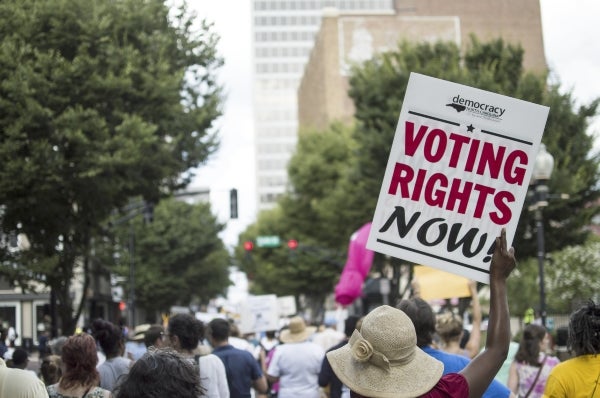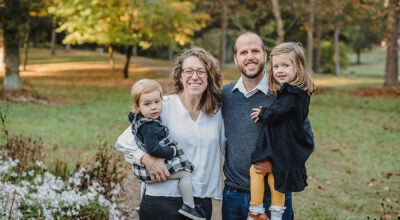Crowd of Salisbury-area residents join voting rights march
Published 12:10 am Tuesday, July 14, 2015

- A member of the Salisbury group that traveled to Winston-Salem holds up a sign during a Moral Monday March. The march occurred on the same day as the start of a federal trial over North Carolina's voter ID law.
WINSTON-SALEM — A horde of thousands, marching and advocating for equal and fair voting rights, descended on downtown Winston-Salem Monday.
Organized by the North Carolina NAACP’s Moral Monday Movement, the march occurred on the same day as the start of a federal trial questioning North Carolina voting laws. The suit focuses on a 2013 measure requiring government-issued photo identification, reducing the number of early voting days, prohibiting same-day registration during early voting and stopping the allowance of election day ballots cast in the wrong precincts.
About 80 Salisbury-area residents — most were high school students in Livingstone’s Upward Bound program — joined the throng of thousands.
“This is something we should be concerned about because it’s going to affect us, the youngest generation,” said Salisbury High student Cameron Horne.
Horne and his peers filled a tour bus and passenger van, arranged by the Salisbury-Rowan NAACP. About a dozen adults not associated with the Upward Bound group also traveled with the NAACP to the Moral Monday March. Like the massive crowd in Winston-Salem, Salisbury’s group was diverse racially.
“This is not about a black or white thing,” Salisbury community activist Alex Clark said to the busload of travelers.
Clark told the students they could make a point, and voice their opinions simply by standing up for what they believe in or sitting down in a silent protest. On Monday, it was a march spanning about ten blocks.
During the march, the crowd chanted, beat on drums and, at times, danced despite the sweltering heat. Signs reading “our voice, our vote” and “voting rights now” were among the many in the crowd. Signs advocating for equal voting rights were almost as plentiful as the thousands of marchers.
The crowd started at Winston-Salem’s Corpening Plaza, circled around downtown in sweltering heat and returned to the plaza for a series of speeches.
North Carolina’s laws have been called an erosion of voting rights. The voting rights movement in North Carolina has been referred to as the state’s version of Selma, Ala. North Carolina’s NAACP President Rev. William Barber in his speech referred to the laws with two words: a sin.
“When we see the Supreme Court undo the Voting Rights Act, then we see Congress refusing to fix it, then we see state legislators and a governor like ours using the absence of pre-clearance to put in the presence of injustice, it’s sin,” Barber exclaimed.
Barber’s fiery speech drew cheers from a crowd that spilled out of the plaza, and into nearby walkways.
Speaking to the Salisbury students after the march, Clark said blacks are the only segment of America’s population that consistently have voting rights revised. He repeatedly referred to gang members, figures described in popular rap music and drug dealers as examples of what students should avoid even in the smallest doses.
“You hear people say their ’bout that life, but why aren’t they out trying to restore voting rights, something that actually matters?” Clark asked. “What’s going to happen when you can’t vote? People are going to start making your decisions for you.”
Rowan resident Nan Lund, who is one of the plaintiffs in the voting rights lawsuit, focused on voter registration when asked about problems with North Carolina’s laws.
“I think what the opposition is going to try to do is show that people really were not harmed,” Lund said. “But, if we can’t be doing voter registration during early voting, then it all has to get crammed into a smaller period of time. It makes it onerous for those that are involved in it.”
Supporters of North Carolina’s laws argue that photo identification at polls prevents voter fraud. Opponents have argued obtaining a government-issued ID can be difficult for those without reliable transportation. Salisbury resident Kathryn Wiggins equated government-issued photo identification to a modern tax poll tax or literacy test.
“It’s about so few people, three people, that must have not been arrested,” Wiggins joked. “If it’s such a problem then we should build more jails.”
Salisbury-Rowan NAACP President Scott Teamer said he was elated to see such a strong youth presence on the bus trip.
The Upward Bound program, based at Livingstone College, lasts six weeks and includes multiple trips to unfamiliar places, said program coordinator Ruby Steele.
Contact reporter Josh Bergeron at 704-797-4246.





